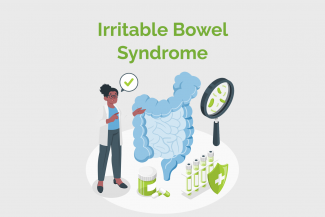Irritable bowel syndrome or IBS is a functional bowel disorder in which abdominal pain or discomfort is associated with a change in bowel habit. Sensations of discomfort (bloating), distension, and disordered defecation are commonly associated features. Its difficult to diagnose and manage. It affects about 10-12% of the population globally.

Diagnoses of IBS:
The doctor will make a diagnosis after evaluating the symptoms. He may suggest a few tests to rule out other possibilities.
Most people will not need testing but it will depend on your age, how your symptoms come on, how severe the symptoms are, and how you respond to your first treatment. For example, a 20-year-old person might not need any tests. But for a 50-year-old with new symptoms, tests would be required because of the higher risk of colon cancer in people over 50.
Tests included are:
- Complete medical history and physical examination
- A blood test for celiac disease, gluten allergy and lactose intolerance
- Complete blood count (CBC)
- Sedimentation rate, which is used to check inflammation in the body
- Stool analysis
Imaging tests that may be suggested:
- Flexible sigmoidoscopy-: This test examines the lower part of the colon (sigmoid) with a flexible, lighted tube (sigmoidoscope).
- Colonoscopy-: If a patient is age 50 or above or has other signs of a potentially more serious condition, the doctor may perform this diagnostic test in which a small, flexible tube is used to examine the entire length of the colon.
- X-ray (radiography)-: Sometimes doctors will use X-rays to obtain image of your colon.
- Computerized tomography scan-: produces Cross-sectional X-ray images of internal organs. CT scans of your abdomen and pelvis may help the doctor rule out other causes of your symptoms, especially if you have abdominal pain.
- Lower GI series-: In this test, the doctors fill your large intestine with liquid (barium) to make it easier to see any problems on the X-ray.
Changed
31/Aug/2017
Condition












